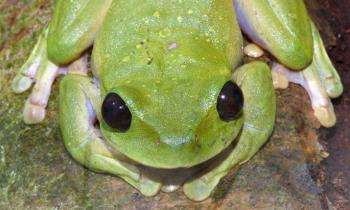Scientists have discovered 56 species believed new to science in Papua New Guinea, including a tiny chirping frog, jumping spiders, and an elegant striped gecko.
The discoveries were announced yesterday by Conservation International whose expedition found the species last summer during a month-long study of Papua New Guinea's central mountains.
(Photo, A newly discovered tree frog © Steve Richards)
More than 600 species were documented during the expedition. Of those, a total of 50 spider species, two plants, three frogs and one gecko are believed to be new to science. The three frogs include a tiny brown frog with a sharp chirping call (Oreophryne sp.), a bright green tree frog with enormous eyes (Nyctimystes sp.), and a torrent-dwelling frog that has a loud ringing call (Litoria sp.), pictured above. The gecko (Cyrtodactylus sp.) was the only specimen of its kind found in the dense rainforest.
The vast highlands and nearby valleys represent one of Papua New Guinea's largest undeveloped wilderness areas. Local clan communities rely on the area for hunting and collecting forest products, and the region is a critical source of clean drinking water to tens of thousands of valley people. Globally, this vast forested wilderness is critical in helping slow climate change by sequestering large amounts of the greenhouse gas carbon dioxide.
As part of the expedition, Montclair State University anthropologist Dr. William Thomas worked with the local Hewa clans to document the natural history and local knowledge of these resources as part of the "Forest Stewards" project, an initiative started by Dr. Thomas and CI's Dr. Bruce Beehler.
"Dr. Thomas has devoted his professional life to the study of the traditional knowledge system of the Hewa people. Their intimate knowledge of and stewardship over a large tract of this vast upland wilderness has led to conservation of their wildlife and environment. Dr. Thomas's goal is to help the Hewa continue this indigenous stewardship into the next century, for the good of these people and the world at large," said Beehler.
The discovery of three entirely novel genera from among the spider species discovered is particularly noteworthy, said UBC scientist Wayne Maddison, Director of the new Beaty Biodiversity Museum. "They are strikingly distinctive evolutionary lineages that had been unknown before, with a group that is already very distinctive on the evolutionary tree of jumping spiders," said Maddison. "Their key position on the evolutionary tree will help us understand how this unique group of jumping spiders has evolved."
Much of Papua New Guinea's vast wilderness remains unexplored for scientific documentation. CI's Rapid Assessment Program (RAP) is planning three more expeditions to the country in 2009 with the first beginning in early April.
Since 1990, CI's RAP program has conducted more than 60 expeditions to the far reaches of the globe, and discovered more than 700 species potentially new to science. A recently launched species discovery initiative provides in-depth information about CI-led expeditions such as RAP surveys and features some of the discoveries which include species potentially new to science.
The "Discovering Species" site contains vibrant content which includes descriptions of the species themselves – often by the scientists who made the discovery, photos of the species, dispatches from scientists in the field, and downloadable survey reports for those who wish to know more. Each month, more species are added as the scientists continue to explore new places as well as catalogue their previous discoveries. (Photo, above, A newly discovered frog uses a loud ringing song to call for a mate© Steve Richards)










Be the first to comment